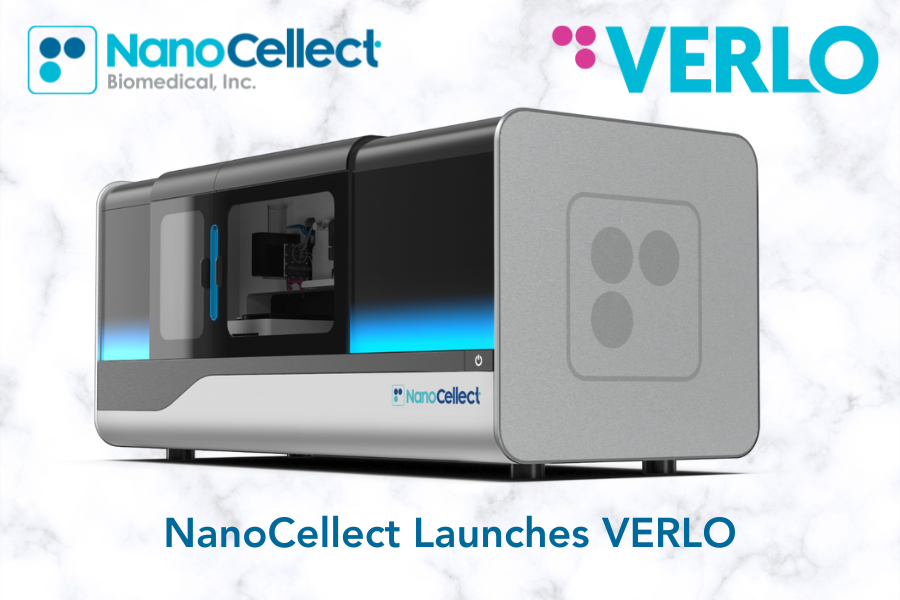NanoCellect Launches VERLO: First Demonstration of Image-Based Sorting of Interacting Immune Synapsed Cells Followed by Confirmation of Immune Functionality

San Diego, CA, July 2, 2024 – (PR Newswire.com) – NanoCellect Biomedical, a leader in microfluidic cell sorting technology, proudly announces the launch of VERLO™ Image-Guided Cell Sorter, a groundbreaking cell sorter poised to redefine the landscape of single-cell visualization and gentle flow cytometry analysis and cell sorting.
Building upon NanoCellect’s innovative WOLF cell sorter platform, VERLO represents a significant leap forward in flow cytometry and cell sorting technology by seamlessly integrating brightfield imaging and fluorescent detection with the microfluidic sorting capabilities of the WOLF cell sorter.
As the world’s first two-laser image-guided cell sorter, the VERLO features label-free image channels and up to nine distinct fluorescent image channels. This revolutionary approach enables researchers to leverage the breadth of morphological understanding and the power of fluorescent illumination to sort individual cells with unprecedented definition. For the first time, scientists are empowered with the widest and most informative range of features, enabling them to explore and define cellular heterogeneity and functional diversity with unprecedented depth.
In immuno-oncology studies, the ability to accurately identify and isolate single cells from doublet populations is critical for understanding native and especially novel engineered synapses, a key pain point in today’s expanding immune cell therapies arsenal. VERLO’s advanced image-guided sorting technology enables researchers to reliably distinguish and sort interacting cells, facilitating precise characterization of cell subsets and validation of their functional phenotypes while maintaining those cell interactions.
VERLO’s real-time imaging capabilities allow researchers to monitor and select single cells based on their morphological characteristics without any labeling for downstream applications such as stem cell characterization, monoclonal antibody production, gene editing, and cell line development. In addition, VERLO’s fluorescent imaging and morphology measurements enable researchers to visualize and sort cells based on their intracellular staining patterns, facilitating the study of cellular dynamics in response to stimuli or therapeutic interventions.
Chris Neary, CEO of NanoCellect Biomedical, commented on the significance of VERLO’s launch, stating, “The addition of VERLO to our portfolio of high viability cell analysis and sorting platforms will take phenotyping and cell capture to a new level, offering a vantage point into cellular biology that normalizes the defining power of morphology with the molecular resolution of fluorescence.” VERLO seamlessly integrates single-cell visualization with trusted FACS capabilities in an easy to use, affordable, benchtop system. As the only image-guided cell sorter utilizing two lasers for imaging, VERLO will accelerate advancements in multiple fields including immuno-oncology, stem cells, and cell therapies.”
The VERLO Image-Guided Cell Sorter has been unveiled at the CYTO 2024 conference in Edinburgh, Scotland on May 7th, 2024, where attendees discussed endless arrays of applications. The launch of VERLO reaffirms NanoCellect’s commitment to innovation and its mission to empower researchers with new tools to advance scientific discovery and improve patient outcomes.
For more information about VERLO and NanoCellect’s suite of cell sorting solutions, please visit nanocellect.com.
About NanoCellect Biomedical
NanoCellect is committed to empowering every scientist to make discoveries one cell at a time. We develop and deliver microfluidic-based solutions that are affordable, compact, and easy to use. By ensuring the high cell viability required to advance cell-based research, our expanding portfolio of instruments and consumables enables biomedical scientists to analyze and sort cells required for drug discovery, single cell-omics, cloning, antibody discovery, and basic research.
